Provost’s Distinguished Visiting Faculty Fellowships
A distinguished visiting faculty fellow is annually selected by Penn’s Provost John L. Jackson, Jr. – nominated by a center, department or school, and approved by the appropriate schools’ Chair or Dean – whose work promotes civic engagement, scholarly innovation and inclusive communities. The appointment is intended for a senior scholar of national or international prominence, with the aim of enriching the intellectual and cultural life of the Penn community.
Fellows can be from any academic discipline, with preference for those whose work is interdisciplinary in nature, promotes the growth of academic fields, and involves novel research, scholarly themes or methods. Fellows may be asked to mentor Penn undergraduate and graduate students, participate in panels and public discussions with senior Penn colleagues, collaborate on research projects, and provide at least one annual talk of significance to the Penn community.
2024-25 Fellow: Patricia Brennan, R.N., Ph.D.
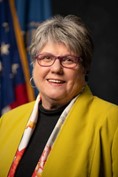
Dr. Brennan served as the director of the National Library of Medicine (NLM) at the National Institutes of Health from 2016 to 2023. As the first nurse, industrial engineer, and woman to lead NLM, she left an impressive legacy at the NIH with her efforts to integrate health information management with artificial intelligence, machine learning, and deep learning to advance the future of healthcare. Dr. Brennan positioned NLM as a global scientific research library with visible and accessible pathways to research and information that are universally actionable and meaningful to empower researchers, clinicians, patients, and caregivers. During her time at the NIH, Dr. Brennan also held an appointment as an adjunct investigator in the National Institute of Nursing Research Division of Intramural Research. There, she directed the Advanced Visualization Laboratory, which developed interactive virtual reality simulations to enable patients with a variety of complex health conditions to rehearse problem-solving behaviors that could foster improved health outcomes in home-based care environments.
2023-24 Fellow: Jamila Michener, Ph.D.
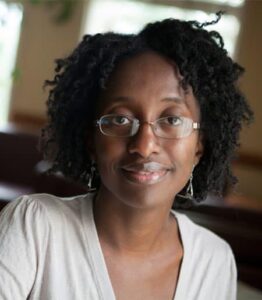
Jamila Michener is an associate professor of government at Cornell University, where she is also the senior associate dean of public engagement of the Brooks School of Public Policy and Inaugural Director of the Center for Racial Justice and Equitable Futures. Her research investigates the ways in which public policy and political institutions shape the material and political lives of people who are economically and racially marginalized—and the ways in which members of such groups gain power to affect policy. Her recent book Fragmented Democracy: Medicaid, Federalism, and Unequal Politics (Cambridge University Press, 2018) examines how Medicaid affects democratic citizenship. Unpacking how federalism transforms Medicaid beneficiaries’ interpretations of government and structures their participation in politics, the book—which received the 2019 Virginia Gray Book Award from the American Political Science Association—assesses American political life from the vantage points of populations that are living in or near poverty, disproportionately Black or Latino, and/or reliant on a federated government for vital resources.
2022-23 Fellow: Kim TallBear, Ph.D.
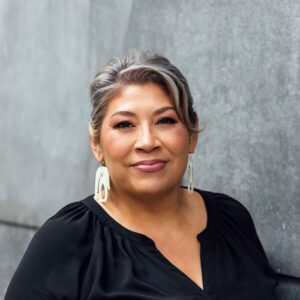 Kim TallBear, author of Native American DNA: Tribal Belonging and the False Promise of Genetic Science (2013), is Professor in the Faculty of Native Studies, University of Alberta. She is also Canada Research Chair in Indigenous Peoples, Technoscience, and Society. In addition to studying genome science disruptions to Indigenous self-definitions and the colonial ethics historically of genomic and other physical sciences, Dr. TallBear studies colonial disruptions to Indigenous sexual relations. She also studies and promotes Indigenous scientific and cultural challenges to settler-colonial study and objectification of Indigenous populations and our social and cultural practices. Kim TallBear is a citizen of the Sisseton-Wahpeton Oyate in present-day South Dakota and is also descended from the Cheyenne & Arapaho Tribes of Oklahoma, where she is also eligible for citizenship.
Kim TallBear, author of Native American DNA: Tribal Belonging and the False Promise of Genetic Science (2013), is Professor in the Faculty of Native Studies, University of Alberta. She is also Canada Research Chair in Indigenous Peoples, Technoscience, and Society. In addition to studying genome science disruptions to Indigenous self-definitions and the colonial ethics historically of genomic and other physical sciences, Dr. TallBear studies colonial disruptions to Indigenous sexual relations. She also studies and promotes Indigenous scientific and cultural challenges to settler-colonial study and objectification of Indigenous populations and our social and cultural practices. Kim TallBear is a citizen of the Sisseton-Wahpeton Oyate in present-day South Dakota and is also descended from the Cheyenne & Arapaho Tribes of Oklahoma, where she is also eligible for citizenship.
2021-22 Fellow: Michele Bratcher Goodwin, J.D., LL.M., S.J.D.
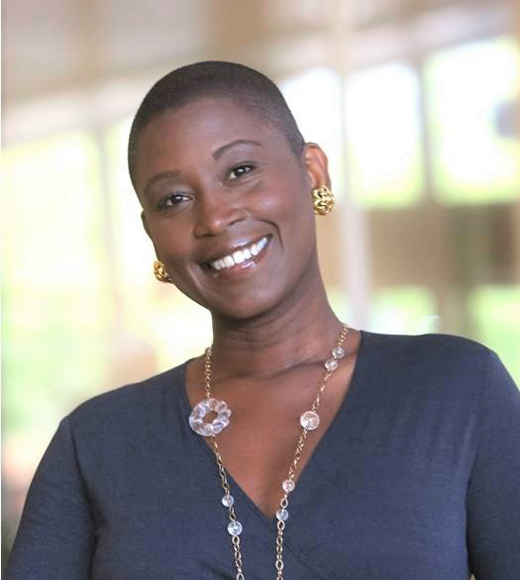 Michele Bratcher Goodwin, Chancellor’s Professor of Law and Founding Director of the Center for Biotechnology and Global Health Policy at the University of California at Irvine, is a pioneer of health law whose visit will be hosted by the Department of Medical Ethics and Health Policy in the Perelman School of Medicine. She led the first ABA-accredited health law program in the United States, established the first law center focused on race and bioethics, and is the author of Policing the Womb: Invisible Women and the Criminalization of Motherhood (2020), Black Markets: The Supply and Demand of Body Parts (2006), and more than 100 articles, essays, and book chapters across both scholarly publications and popular media.
Michele Bratcher Goodwin, Chancellor’s Professor of Law and Founding Director of the Center for Biotechnology and Global Health Policy at the University of California at Irvine, is a pioneer of health law whose visit will be hosted by the Department of Medical Ethics and Health Policy in the Perelman School of Medicine. She led the first ABA-accredited health law program in the United States, established the first law center focused on race and bioethics, and is the author of Policing the Womb: Invisible Women and the Criminalization of Motherhood (2020), Black Markets: The Supply and Demand of Body Parts (2006), and more than 100 articles, essays, and book chapters across both scholarly publications and popular media.
2020-21 Fellow: Lance Freeman, Ph.D.
Lance Freeman is a Professor in the Urban Planning program at Columbia GSAPP. His research focuses on affordable housing, gentrification, ethnic and racial stratification in housing markets, and the relationship between the built environment and well being. Professor Freeman teaches courses on community development, housing policy and research methods. Dr. Freeman has published several articles in refereed journals on issues related to neighborhood change, urban poverty, housing policy, urban sprawl and residential segregation. Dr. Freeman is also the author of the book There Goes the Hood: Views of Gentrification from the Ground Up (Temple University Press). He also obtained extensive experience working with community development groups while working as a Community Development coordinator for the North Carolina Institute of Minority Economic Development and as a Research Associate at the Center for Urban and Regional Studies in Chapel Hill, North Carolina. Dr. Freeman also has professional experience working as a City Planner for the New York City Housing Authority, and as a budget analyst for the New York City Department of Environmental Protection.
2019-20 Fellow: George Yancy, Ph.D.
George Yancy, the Samuel Candler Dobbs Professor of Philosophy at Emory University, is an American philosopher and public intellectual. He works primarily in the areas of critical philosophy of race, critical whiteness studies, critical phenomenology (especially, on racial embodiment), and philosophy of the Black experience. Yancy has written provocative essays and conducted engaging and insightful interviews with such prominent intellectuals as Noam Chomsky, Judith Butler, Cornel West, Peter Singer, Anthony Appiah, and many others, at the New York Times, “The Stone.” He is the author, editor and co-editor of over 20 books. Some of his books include Black Bodies, White Gazes: The Continuing Significance of Race in America, Look, A White! Philosophical Essays on Whiteness, On Race: 34 Conversations in a Time of Crisis, and Backlash: What Happens When We Talk Honestly about Racism in America. His forthcoming books engage questions of race, whiteness, sexism, African American philosophy, language, and culture.
Spring 2022 Visiting Faculty Scholar: Sydney Freeman, Jr.
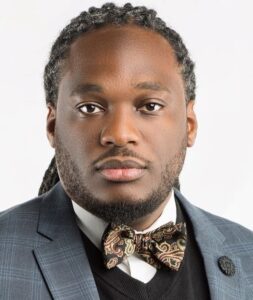
As a visiting scholar, professor freeman will assist with an assessment of racial diversity initiatives for Penn faculty that are currently supported by Penn’s provost’s office. He will also develop an academic leadership symposium that focuses on advancing institutional policies and supports that improve retention and advancement of mid-career faculty of color at Penn.
Dr. Sydney Freeman Jr. is a Full Professor in the College of Education, Health & Human Sciences at the University of Idaho. He is an international authority on such topics as higher education leadership, higher education programs and leadership/administration, and graduate education. Dr. Freeman has published nearly 100 scholarly and academic related manuscripts and has lectured and presented at institutions such as Harvard University, Oxford University (UK), Jerusalem College of Technology (Israel), and RMIT University Vietnam, Saigon. He was the recipient of the College of Education Outstanding Young Alumni Award for the year 2020 at Auburn University and recognized as one of the recipients of the “Accomplished Under 40” for the year 2020 by the Idaho Business Review. And he recently earned the prominent 2021 University of Idaho mid-career faculty award.” In November, Dr. Freeman gave and received the Barbara Townsend Lecture and Award from the Association for the Study of Higher Education which, recognizes a scholar whose work focuses on community colleges, feminist studies, doctoral education, and/or higher education leadership preparation programs.

